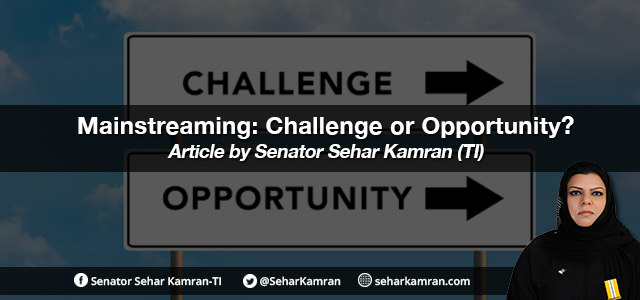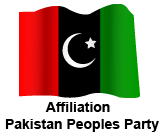By Senator Sehar Kamran (TI)
July 29, 2018
 “The debate on the process of mainstreaming must be initiated from the Parliament. All issues ranging from madrasah, Charter of Peace and Reconciliation, De-radicalisation of these organisations must be addressed to avoid splintering and resurfacing of violent groups with new names. Political resolve is essential for curbing this menace and achieving the lasting peace.”
“The debate on the process of mainstreaming must be initiated from the Parliament. All issues ranging from madrasah, Charter of Peace and Reconciliation, De-radicalisation of these organisations must be addressed to avoid splintering and resurfacing of violent groups with new names. Political resolve is essential for curbing this menace and achieving the lasting peace.”
Violent extremism has posed one of the greatest threats in Pakistan’s history to its stability and prosperity, as well as to peace within the region at large. Two decades of the War on Terror had allowed the deadly instability along the borders to move inwards, distorting the very fabric of our society. It has taken a long and difficult struggle and great sacrifices from the people of Pakistan and its Armed Forces to reclaim this space from terrorists, but we continue to struggle with taking back the space that has become occupied by violent extremists and their narratives.
The complexity of this issue is exacerbated by a multitude of extenuating factors, ranging from the broad religio-political spectrum in the country to our immense ethnic diversity.
Radical and violent extremist narratives gained traction as a consequence, in many ways, of the State’s failure to perform its basic duties and fulfil responsibilities, such as ensuring the welfare of its citizens and guaranteeing law and order in the country.
When the rights of the people were neglected, a vacuum was created, and violent extremist groups thrived in this vacuum. They utilised the social injustices to make inroads into society, and gain legitimacy among the masses, by adopting approaches like charity welfare work and narrative formation to gain attention and sympathy, without revealing the more nefarious agendas of their leadership to the public.
These organisations present themselves as ‘messiahs’ for the people. Their philanthropic activities allow them to expand the sphere of influence and acceptability for their religio-political messages.
Only once the conversion is complete are the more violent activities and agendas revealed to followers, who, by that point are far too devoted to be able to retract themselves from the cycles of violence that follow.
It also does not help that some militant groups which rose to prominence in the 1980s and 1990s were once patronised by various external entities to achieve the interests of super powers, and then abandoned or proscribed in the aftermath of 9/11, without a de-radicalisation program in place to deal with the fallout. Members of these organisations then renamed the groups, while continuing their controversial activities.
Over the past year, a new peculiarity has emerged. In the aftermath to Operations Rah-e-Raast, Zarb-e-Azb and Radd-ul-Fasad, some militant organisations have been seeking to move onto more legitimate political platforms, without altering or abandoning their demagogic ideologies, and dismissing the activities of their militant wings as irrelevant to their political messages, if owning them publicly at all. The emergence of the ‘Tehreek-e-Labbaik’ and the ‘Milli Muslim League’ in the political sphere are the most prominent examples of this transformation.
For a country like Pakistan where democracy remains fragile, this phenomenon is extremely dangerous as it normalises the narratives as well as the underhanded methods utilised by extremist organisations.
Their relative success also creates space for other parties to follow suit in order to achieve their goals, by presenting themselves as hardliners.
Domestically in Pakistan, voices remain divided over this ‘mainstreaming’ or ‘integration’ of violent extremist organisations into the fold of politics. Some circles are of the opinion that just as in the past, in many parts of the world, militant organisations have been successfully reintegrated into society and directed away from violence through the platform of mainstream politics, it may be possible to achieve the same in Pakistan.
That, however, may be oversimplifying a complex issue. For example, one of the examples often put forward is that of Indonesia, where many former members of the “Jemaah Islamiyah” were successfully reintegrated.
But what is missed is that only happened after the individuals had gone through intensive de-radicalisation programs, given up violence, accepted the constitution and bowed to the rule of law.
The alternate perspective considers this to be simply a dangerous precedent that will only breed further violence and extremism in the already murky political sphere of Pakistan. The ideology, literature and purpose of many of these groups are rooted in violence, and analysts worry they may believe they can implement their more radical ideological goals once power has been attained.
Furthermore, many of these groups do not submit to the constitution completely, or accept the rule of law, human rights, and many of the other democratic values that the State propagates.
As witnessed during the Tehreek-e-Labbaik’s Faizabad Dharna last year which led to the resignation of the then Law Minister, and later attack on him by an individual apparently inspired by the teachings of the ‘Tehreek-e-Labbaik’ lend further credence to the concern that mainstreaming such organisations without de-radicalisation is only playing with fire.
It is also a fact that ideologically motivated proscribed organisations are unlikely to abandon their principal philosophies, and consequently the reintegration of banned outfits by allowing them political space without submission to the Constitution is simply not possible.
Furthermore, a country faced with the sort of hybrid warfare that Pakistan has been facing, it is also important to consider the potential exploitation of these groups by hostile external parties to achieve their own goals.
Today, we as a state are looking to non-military solutions against extremism and for the protection of vulnerable citizens exposed to radical narratives. The complex militant landscape of Pakistan poses a dilemma that requires a multi-pronged approach for a reintegration framework in order to neutralise the threat they present. This includes revisiting the implementation of the National Action Plan, and catering to the fundamental needs of the population. It includes civilian responsibility for the process of de-radicalisation, just as the military has taken in the past with Centres such as Sabawoon.
Moreover, we must remember that Pakistan is signatory to numerous international laws that bar the inclusion of militants, militant organisations, violence, intolerance and discrimination in any form. Failure to adhere to our commitments under international law will adversely affect the state’s image and standing within the international community, and in turn, impact economic policies towards Pakistan.
Consequently, it is important for us to keep this in mind when considering means and strategies to help with the reintegration process of fringe elements. In this context, I would also like to suggest revisiting the recommendations put forward by the ‘National Policy for Peace and Harmony’ that was launched by the Centre for Pakistan and Gulf Studies (CPGS) in August 2013. This task is enormous and cannot be undertaken alone by any government, political party or group. There is an urgent need to start the process at the earliest. If followed, true progress can be made in the right direction.
Same version of the article appeared in The Nation


